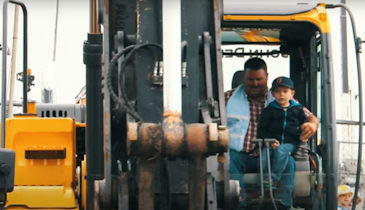Interested in Safety?
Get Safety articles, news and videos right in your inbox! Sign up now.
Safety + Get AlertsIt’s pop quiz time, so pull out your pencils and notebooks and answer this question:
You’re working on site to replace a residential sewer lateral and you need to dig a hole near the building to insert your pipe bursting equipment. Do you:
A) Talk to the homeowner and ask where lines enter the residence.
B) Guess where the lines are. After all, you’ve been doing this for a while. You’re no rookie.
C) Call 811 and have the utility lines marked before starting the job.
Put down your pencils. I hope you answered “C.”
Make the call
It’s a simple enough premise: Make a call to 811, have utility lines marked and — only then — dig. And yet, in 2012, more than 230,000 underground utility events were submitted to the Common Ground Alliance, and of those, nearly 25 percent occurred because a locate request was not made.
Now, before we get buried in numbers and statistics, let’s simplify this a little. That means, according to the newly released 2012 Damage Information Reporting Tool report, a lot of very preventable incidents are occurring. The good news? We’re all doing better. Incident numbers are down for the third consecutive year. The bad news? We’re not there yet. Just imagine how different those numbers would look if every homeowner, farmer, excavator and installer made a call for line location before even touching a shovel or backhoe.
Bob Kipp, the CGA president, thanks 811 awareness campaigns for the continuing reduction in incident numbers.
“It is more clear than ever that calling 811 before digging is the most critical step in preventing damage to underground facilities,” Kipp says. “DIRT data has now demonstrated this for three years in a row.”
Learning the risks
During any excavation project, you have three major points of opportunity to eliminate problems. First, make sure you call 811, as we’ve already covered. Next, your request has to be fulfilled and the lines properly marked, and finally, you, as the digger, need to make sure you’re using the right excavation techniques for the site. Be sure to take soil type and condition into account.
When those three precautions are taken, you greatly reduce the risk of damage to underground utilities and to personnel.
And here’s the really encouraging statistic that came out of this year’s study: When a locate request is made by a digger, damage occurs less than 1 percent of the time. Now those are some pretty favorable odds that anyone should be excited about. It’s in your hands. When you make the call to 811, you immediately protect the safety of your crew.
Dealing with exemptions
For the fist time ever, the DIRT report also addresses the effect of one-call notification exemptions. What the report found was that in states where exemptions are high, incident reports also increased. The recommendation: Continue to encourage calling for digger information even if an exemption exists.
It’s that simple: Always call 811 before digging.
So if you’re quizzed again on the importance of calling for digger information, remember that the answer is always “Call 811.” Reducing utility damage and preventing injury is in your hands. Make the call.





